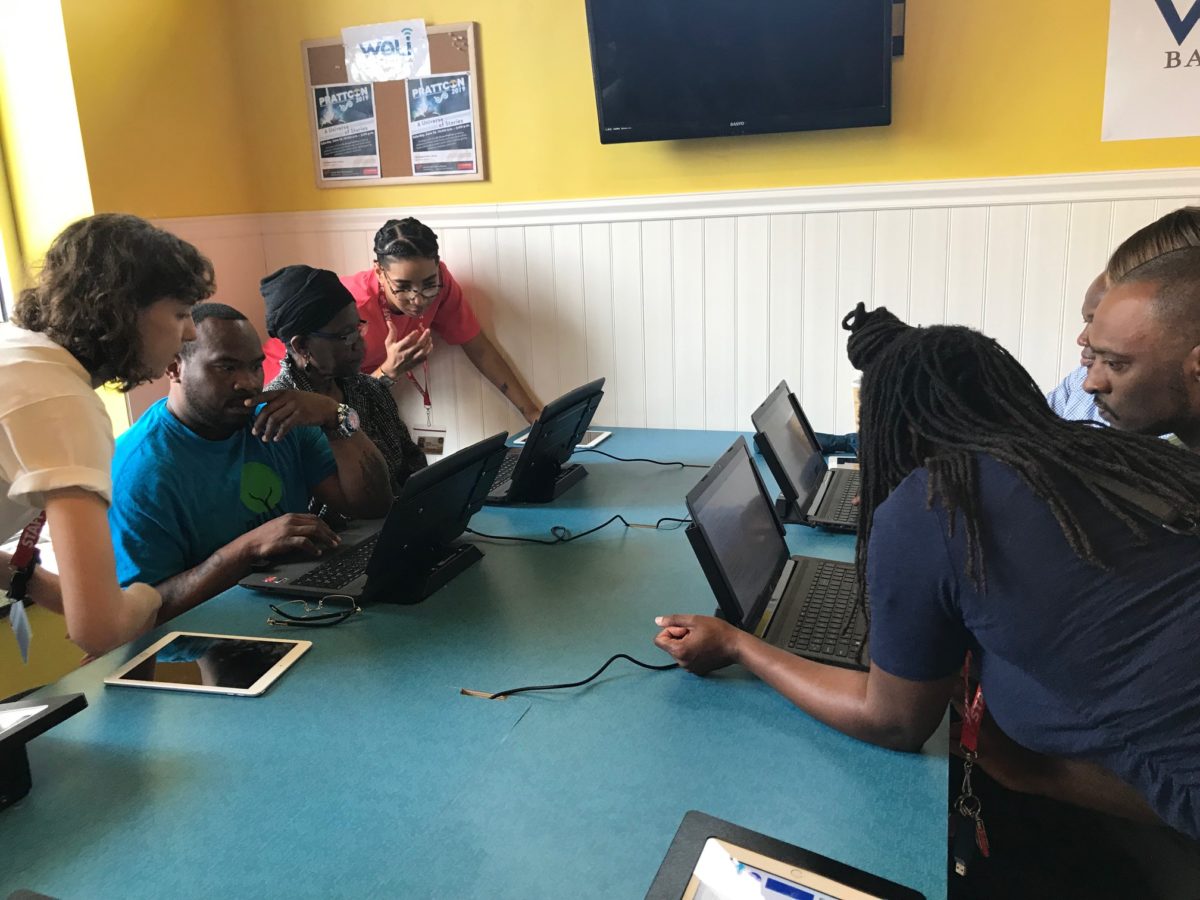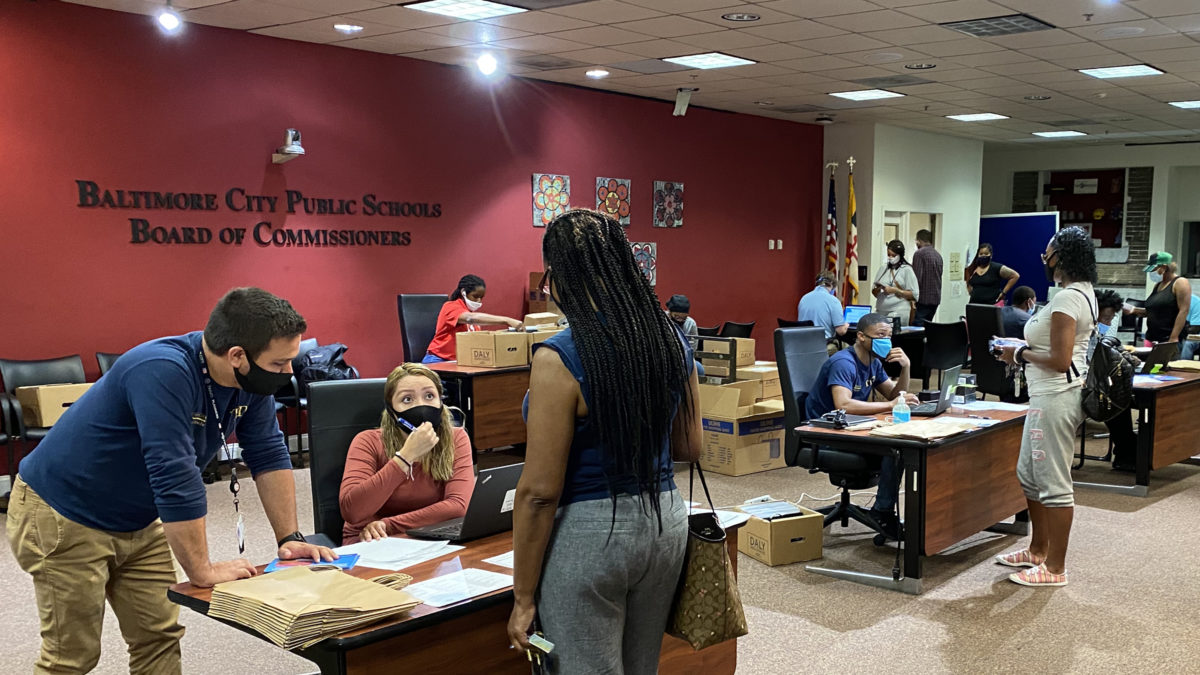More than half of teachers in low-income communities say that their students’ lack of access to online resources at home presents a major challenge, the Pew Research Center reported in 2015.
COVID-19 has put a spotlight on the digital divide: the unequal distribution of computers, internet, and digital literacy across the US. Yet, as the Pew study reminds us, this issue has persisted for years, often under the radar. The incoming mayor must act urgently to ensure that this spotlight on digital inequity does not fade as we adjust to the changes that 2020 has brought to our day-to-day lives. Without a holistic and long-term digital equity plan for the City, families will remain unable to access the education, employment, healthcare and other online resources needed to succeed. We need a holistic and long-term digital equity plan for the City, now.
Today, roughly one third of Baltimore households lack a computer or high-speed internet at home. These children, working adults and elderly residents are predominantly low-income, Black, and Latinx. Digital inequity reaches into every facet of life and affects every sector of the economy. While the City Council and Baltimore City Public Schools have made bold strides, the incoming mayor and staff must look beyond a single agency, organization or short-term solution and work collaboratively to develop a long-term digital equity strategy, coupled with a multi-year investment in expanding access to internet, computers, and digital literacy skill building for all.
The COVID-19 pandemic and subsequent stay-at-home directives have closed our schools and libraries, and pushed our most basic services online. Computers and internet access are no longer a luxury, but a basic necessity of life—just like a phone or electricity:
- Working adults need reliable internet access to apply for jobs and work remotely.
- Our seniors need internet access to apply for benefits online and attend telehealth sessions.
- With courts back in session, residents may require remote access to participate in their hearings.
In recent months, Baltimore City Public Schools mobilized to provide thousands of computers and hotspots for students, thanks to a $3 million allocation from City Council, allocation of CARES funding, and support from numerous private foundations. This “herculean” effort serves as a model to the state, but it alone is not enough. Last month, as many as 4,000 Baltimore public charter school students started the school year without a computer, according to the Maryland Association of Public Charter Schools (MAPCS). More than 1,000 charter school students lacked internet at home, too. Ineligible for BCPS initiatives and held to a different set of policies, the Digital Equity Coalition, MAPCS, and the Baltimore Community Foundation sprang into action to support these students.
These grassroots efforts have helped to close the gap in the short-term, but they only can do so much without the city’s support. In April, Libraries Without Borders launched the ConnectED program to provide computers, WiFi hotspots, books, and local information to 100 Baltimore families who had been participating in digital literacy programs at the four laundromats of the Wash and Learn Initiative. LWB quickly opened the program to the public in an effort to help populations who did not qualify for a computer or hotspot through other means. Word spread fast, and Libraries Without Borders is now faced with a waiting list of more than 400 people, including charter school students, working adults and seniors.

Librarians helping customers with computer skills. (Photo by Stephen Babcock)
Survey results from the past few months demonstrate that parents are playing a larger role in the remote education of their children. For parents who have never or rarely used a computer and have relied only on smartphones, supporting their children in remote learning has been a challenge from the outset. These parents are struggling to make informed decisions about internet service in the home. They are unsure how to obtain the technology available for their child, and, in many cases, feel ill-equipped to handle the inevitable tech issues that arise. These issues then fall on teachers. Baltimore City Public Schools expanded their IT services to include tech support for students; no such service exists for many small independent public charter schools.
These same parents require computers and digital skills themselves in order to find and maintain a living-wage job and to access healthcare, financial services, and public benefits — especially during this pandemic. Thousands of adult education and workforce training participants across the city have been working for years to gain the skills needed to succeed in the city. But, like youth, they cannot thrive in a virtual classroom without the proper tools and support. In August, the Baltimore Digital Equity Coalition launched a tech support hotline for adult learners in education and workforce development programs. It is a critical step towards a more connected city, but few tech support systems exist to support everyone else: the elderly couple trying to arrange a grocery pick-up, the single adult trying to meet with their doctor online for a critical appointment or the English-language learner trying to navigate online legal services.
Fast, reliable internet connection remains an indomitable barrier for all populations in the city. Comcast and other internet service providers have the capacity to provide the fastest connection for the greatest number of people, but are too expensive for the very low-income families who need it most. The U.S. ranks 119th out of 206 countries in the world for broadband internet affordability, in part due to a lack of competition in the marketplace. Baltimore’s contract with Comcast makes the City no exception. Comcast’s Internet Essentials program, which provides $10/month internet for qualified low-income households, has become a lifeline for families who need the internet to access school and/or basic services during the pandemic, but it provides a poor substitute for high-speed, equitable internet. In the early weeks of the COVID-19 shutdowns, Baltimore City College High School students from SOMOS pushed Comcast to expand and strengthen the Internet Essentials program. While the company extended its free trial for new customers, it left current Internet Essentials families with the same insufficient internet speeds and with no official recourse for those who simply cannot afford their Comcast bills.
With the contract between Comcast and Baltimore in place until 2026, City Council and advocates must continue to put pressure on Comcast to improve internet speeds and affordability for city residents. At the same time, the City should examine bold, new solutions, such as the municipal broadband networks taking root in cities and counties across the country. Baltimore owns a trove of its own valuable internet fiber and real estate that it has failed to activate effectively to date. These city assets could serve as the baseline for cheaper, high-quality internet for schools, libraries and even residents themselves, especially in low-income neighborhoods with poor internet coverage.
The incoming mayor has the opportunity to turn Baltimore into a national leader for digital equity.
As Baltimore reels from a worldwide pandemic and heads into a mayoral transition this fall, there is no better time to set forth a vision that ensures all residents have an internet connection, a computer at home and basic digital skills. To start, Baltimore can look to the actions of other cities around the country, such as Salt Lake City, Louisville, New York, or Detroit. They have created city departments dedicated to promoting digital equity. In most cases, these cities have also created funds that support digital literacy training and assistance in obtaining low-cost computers. The incoming mayor should also expand tech support services to include all residents and issue annual, neighborhood-level reports on the state of internet, computer access and digital skills in the city.
The incoming mayor has the opportunity to turn Baltimore into a national leader for digital equity. We need a clear, multi-year strategy that guides the city to promote internet connectivity for all, to ensure every home has a computer and to equip every resident with basic digital skills. It is beyond time for Baltimore to make a serious investment to close the digital divide and create the infrastructure for a more equitable city for generations to come. The City’s education system, its economic growth, and its job competitiveness depend on it.
Before you go...
Please consider supporting Technical.ly to keep our independent journalism strong. Unlike most business-focused media outlets, we don’t have a paywall. Instead, we count on your personal and organizational support.
3 ways to support our work:- Contribute to the Journalism Fund. Charitable giving ensures our information remains free and accessible for residents to discover workforce programs and entrepreneurship pathways. This includes philanthropic grants and individual tax-deductible donations from readers like you.
- Use our Preferred Partners. Our directory of vetted providers offers high-quality recommendations for services our readers need, and each referral supports our journalism.
- Use our services. If you need entrepreneurs and tech leaders to buy your services, are seeking technologists to hire or want more professionals to know about your ecosystem, Technical.ly has the biggest and most engaged audience in the mid-Atlantic. We help companies tell their stories and answer big questions to meet and serve our community.
Join our growing Slack community
Join 5,000 tech professionals and entrepreneurs in our community Slack today!

The person charged in the UnitedHealthcare CEO shooting had a ton of tech connections

From rejection to innovation: How I built a tool to beat AI hiring algorithms at their own game

The looming TikTok ban doesn’t strike financial fear into the hearts of creators — it’s community they’re worried about



